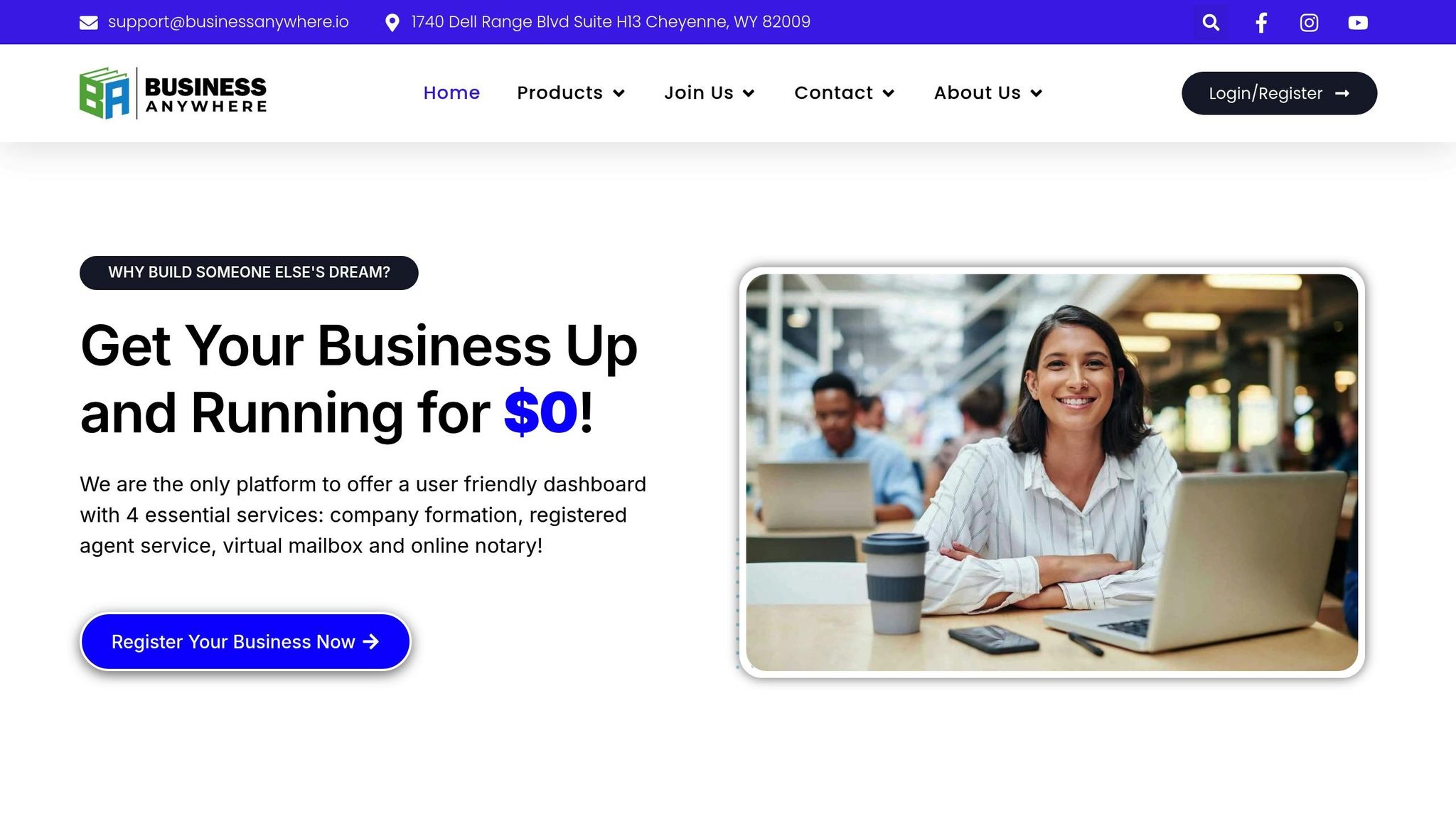A blind LLC, also known as an anonymous LLC, is a business structure designed to keep its owners’ identities private while offering the same legal protections and tax benefits as a standard LLC. Here’s how it works:
- Privacy: Owner details are not listed in public records. States like Delaware, Wyoming, and New Mexico allow this structure.
- Registered Agent: A third-party registered agent handles legal correspondence, keeping personal information off public filings.
- Uses: Often used by entrepreneurs, investors, or individuals seeking privacy for real estate purchases, asset protection, or business operations.
Key Benefits:
- Protects personal information from public exposure.
- Shields personal assets from business liabilities.
- Allows discreet transactions.
Challenges:
- Higher setup and maintenance costs.
- Federal reporting requirements still apply.
- Limited to specific states.
Blind LLCs are ideal for those prioritizing privacy but come with added costs and compliance complexities. While they offer robust privacy protections, anonymity is not absolute, as banks and federal agencies may still require ownership disclosure.
What is a Blind LLC?
A blind LLC is a type of limited liability company designed to keep its owners’ identities private. This is achieved by leveraging state laws that allow the use of nominee managers or registered agents instead of listing the actual owners in public records. These legal structures provide a layer of privacy for business owners who prefer to remain anonymous.
"An anonymous LLC helps business owners keep their identities private by using a third-party registered agent." – UpCounsel
With the increasing availability of corporate filings online, safeguarding owner privacy has become more important than ever. Below are the main features that make a blind LLC an effective tool for maintaining this privacy.
Key Features of a Blind LLC
A blind LLC stands out due to its unique privacy safeguards. For starters, the owners’ names are not included in public filings. Instead, state records typically list only the registered agent and the organizer, neither of whom need to be the actual owner or business manager. For example, in New Mexico, the state does not retain ownership records, requiring only the registered agent and organizer’s names on the Articles of Organization.
Registered agents play a crucial role in this setup. These third-party agents manage official correspondence and provide a registered address for the business, ensuring that the owners’ personal details remain off public records. Essentially, the registered agent acts as the public face of the company for legal and administrative matters.
Additionally, blind LLCs can incorporate layered privacy measures, such as series LLCs or blind trusts, to further obscure ownership.
Common Names and Terms
Blind LLCs are often referred to by other names, including Anonymous LLC, ghost LLC, confidential LLC, secret LLC, and private LLC. While the terminology varies, all these terms highlight the emphasis on keeping ownership details out of public view, while still offering the operational and legal advantages of a traditional LLC.
How Blind LLCs Differ from Standard LLCs
Let’s break down how blind LLCs set themselves apart from standard LLCs. While both structures offer the same legal protections and tax advantages, they differ significantly when it comes to privacy and public disclosure. The key distinction lies in how owner information is handled.
Here’s a closer look at the rules surrounding owner disclosure and the states that allow blind LLCs.
Owner Disclosure Rules
When forming a standard LLC, the names of members and managers are typically included in public records. This transparency can be beneficial for building trust but comes at the expense of privacy.
Blind LLCs, on the other hand, shield owner information from public databases. However, it’s important to note that certain federal requirements, such as the Beneficial Ownership Information Report mandated by the Corporate Transparency Act, or legal subpoenas, may still necessitate disclosing ownership. Additionally, banks and financial institutions often require owner identification when opening business accounts.
States That Allow Blind LLCs
Not all states permit the formation of blind LLCs. Delaware, Wyoming, New Mexico, and Nevada are the primary states that offer this structure, each with its own unique benefits:
- Delaware: Known for its business-friendly environment and specialized Chancery Court, Delaware does not require members or managers to be listed in public records. However, it does require a registered agent and the payment of an annual franchise tax.
- Wyoming: Offers strong privacy protections with minimal ongoing requirements. Wyoming does not include personal information in public records, has no state income tax, low annual fees, and allows single-member LLCs to remain anonymous.
- New Mexico: A cost-effective option with low startup costs and no requirement for annual reports. New Mexico also keeps owner and manager details off public records.
- Nevada: Typically excludes ownership information from public databases and does not impose state corporate or personal income taxes. However, in some situations, member and manager details may still need to be disclosed.
Standard LLC vs Blind LLC Comparison
| Feature | Standard LLC | Blind LLC |
|---|---|---|
| Owner Disclosure | Publicly listed in state records | Not publicly disclosed |
| Privacy Level | Lower – owner names are accessible | Higher – personal details are private |
| Formation Requirements | Standard state filing with owner names | Filing in privacy-friendly states |
| Compliance Complexity | Standard state and federal requirements | Standard requirements but may face extra scrutiny |
| Cost | Lower setup and maintenance costs | Higher due to registered agent fees |
| Banking and Financing | Easier approval with transparency | May require additional documentation |
| Business Credibility | Easier to build trust with transparency | Can face challenges in establishing trust |
While both types of LLCs provide the same legal protections and tax benefits, the decision ultimately comes down to your priorities. If privacy is a top concern, a blind LLC might be the way to go – just be mindful of the potential hurdles in banking and building trust with customers.
Why Choose a Blind LLC?
Blind LLCs are a popular choice among entrepreneurs, investors, and business owners who value privacy and asset protection. These entities help shield personal information while ensuring financial security – a combination that’s increasingly important in today’s interconnected world.
Privacy Protection
Publicly disclosing ownership details can open the door to harassment, doxxing, and unwanted attention. By keeping ownership information private, blind LLCs help minimize these risks. For example, lottery winners often use anonymous LLCs paired with trusts to avoid being overwhelmed by unsolicited offers or attention from strangers. Beyond privacy, this approach also strengthens the separation between personal and business interests.
Asset Protection
Blind LLCs act as a buffer between personal and business assets, reducing personal financial exposure in the event of legal disputes. For instance, real estate investors often rely on blind LLCs to protect their personal wealth from litigation. This separation isn’t just theoretical – it’s a practical safeguard that aligns with everyday business practices.
Real-World Use Cases
The benefits of blind LLCs extend across various industries and scenarios. Businesses might use them to discreetly purchase property, avoiding price hikes that can occur when the buyer’s identity is revealed. Similarly, entrepreneurs may prefer anonymity to prevent competitors from gaining an advantage or to avoid premature media scrutiny. Professionals in high-liability fields, such as healthcare, often turn to blind LLCs to shield personal assets from legal claims. With over 30 million small businesses in the U.S., many of which are searching for affordable ways to maintain privacy, blind LLCs provide a practical and accessible solution.
sbb-itb-ba0a4be
Pros and Cons of Blind LLCs
Blind LLCs, like any business structure, have their own set of upsides and challenges. Understanding these can help you decide if this privacy-focused approach aligns with your goals and risk tolerance.
Benefits of Blind LLCs
Stronger Privacy Protection ensures your personal details stay out of public records. This added layer of privacy can help reduce risks like identity theft, harassment, or unwanted solicitations – going beyond the standard measures most businesses rely on.
Clear Asset Separation helps protect personal wealth from business liabilities. By creating a distinct legal barrier, it becomes harder for creditors to reach individual assets.
Discreet Transactions allow you to conduct sensitive acquisitions or investments without revealing your identity. This can be especially useful in avoiding price manipulation during negotiations.
State-Specific Options offer flexibility depending on your needs. For instance, Delaware charges a $300 franchise tax, Wyoming has a low $50 fee, and New Mexico offers a low filing fee with no annual report requirements.
However, alongside these benefits come certain challenges that need to be carefully considered.
Risks and Compliance Issues
Federal Reporting Rules remain in place despite state-level anonymity. Agencies like the IRS and FinCEN require ownership disclosure, and banks also demand transparency for account setup and compliance.
Higher Operating Costs can add up due to the need for registered agents, nominee services, and legal advisors.
Regulatory Oversight increases if there’s suspicion of misuse. As one legal expert explains:
"An anonymous LLC is a private LLC where ownership information is not disclosed to the Secretary of State. It is not a mechanism to avoid paying taxes or move money around anonymously." – Law 4 Small Business
Financing Hurdles may arise because lenders and investors often require clear ownership details before offering capital, making anonymity a potential obstacle for securing loans or partnerships.
Complex Compliance Requirements demand constant monitoring of state and federal regulations. As compliance experts point out:
"Compliance is not an administrative burden – it is a fundamental part of a business’s long-term success." – Traverse Legal
Limited State Availability means only a handful of states allow anonymous LLCs, which might require forming your business in a jurisdiction different from where you operate.
Benefits vs. Risks Summary
| Benefits | Risks |
|---|---|
| Keeps personal information private | Federal reporting rules still apply |
| Protects personal assets from business liabilities | Higher costs for professional services |
| Enables discreet transactions | Increased regulatory scrutiny if misused |
| Offers flexibility with state options | Financing and investment barriers |
| Reduces risks of harassment or unsolicited contact | Complex compliance requirements |
| Facilitates private acquisitions | Limited state options for formation |
Choosing a blind LLC comes down to weighing privacy against the added costs and complexities. For businesses dealing with sensitive transactions or individuals needing robust asset protection, the advantages may justify the effort. On the other hand, smaller businesses with fewer resources might find the additional layers unnecessary for their needs.
How to Form and Maintain a Blind LLC
Creating a blind LLC involves completing essential legal steps while prioritizing your privacy.
Formation Steps
Pick the Right State and Secure Your Business Name. States like Delaware, Wyoming, New Mexico, and Nevada are popular for their privacy-friendly statutes. Start by conducting a business name search to ensure your chosen name is unique and available for registration.
Hire a Registered Agent. A registered agent acts as your business’s official contact, keeping your personal information off public records.
File Formation Documents. Submit the necessary paperwork to the Secretary of State in your chosen state.
Get an Employer Identification Number (EIN). You’ll need an EIN from the IRS for tax and banking purposes. While personal details are required for this process, they are not made public.
Register as a Foreign Entity. If you operate in a state other than where the LLC is formed, you’ll need to register as a foreign entity in that state.
"An anonymous LLC keeps your personal information off public records and protects your privacy."
Following these steps ensures your LLC is legally formed while safeguarding your privacy. Once established, staying compliant with state regulations is key to maintaining both privacy and legal standing.
Ongoing Requirements
To keep your blind LLC in good standing, meet its ongoing legal and compliance obligations.
Annual Reports and Franchise Taxes: Many states require LLCs to file annual reports and pay associated fees. For instance, California mandates an $800 minimum franchise tax annually, even for LLCs with no profits. In contrast, Pennsylvania only requires an LLC report once every 10 years.
Registered Agent Updates: Ensure your registered agent’s address and availability are current. This is crucial to avoid compliance issues.
Review and Update Your Operating Agreement: Regularly update your operating agreement to reflect changes in ownership, membership, or operations. This keeps the document accurate and legally valid.
Renew Licenses and Permits: Depending on your industry, you may need to renew business licenses periodically to maintain compliance.
Stay Tax Compliant: File all required federal, state, and local taxes on time. LLCs can choose how they are taxed, whether as a pass-through entity or as a corporation.
Setting reminders for these tasks can help avoid penalties or even the risk of your LLC being dissolved by the state.
How BusinessAnywhere Can Help
BusinessAnywhere simplifies the process of forming and maintaining a blind LLC with privacy-focused services tailored to your needs.
- Registered Agent Services: Protect your personal information by using professional representation for receiving legal and official correspondence.
- Virtual Mailbox: Manage business mail remotely with unlimited scanning, storage, and mail forwarding, keeping your personal address private.
- Compliance Alerts: Stay on top of annual reports, tax deadlines, and other critical filings through dashboard notifications, minimizing the risk of penalties.
- Document Management Dashboard: Organize and access essential LLC paperwork – like formation documents and operating agreements – all in one place.
- 24/7 Service Access: Manage your LLC requirements anytime with flexible, digital tools.
BusinessAnywhere’s services are designed to protect your privacy while simplifying LLC management. Plans start at just $20 per month, offering an affordable solution for privacy-conscious businesses.
Conclusion
To wrap things up, a blind LLC offers a solid option for business owners who value privacy while still enjoying the flexibility and legal protections of a standard LLC. By keeping your personal information out of public records, it’s particularly appealing for real estate investors, high-profile individuals, or those operating in sensitive industries.
The main perks include stronger privacy and asset protection, but it’s important to weigh those against the higher setup costs and the added complexity of compliance. The actual cost of forming a blind LLC varies depending on the state, with options ranging from more affordable to higher-end, based on the jurisdiction and your specific needs.
That said, anonymity isn’t foolproof. Banks, the IRS, and courts can legally demand ownership details when necessary. Plus, a blind LLC doesn’t exempt you from taxes, legal obligations, or potential subpoenas. It’s a tool, not a shield, and understanding its limits is key.
FAQs
What steps are involved in forming a Blind LLC, and how is it different from a standard LLC?
Forming a Blind LLC starts with selecting a state that prioritizes owner privacy, like Delaware, Wyoming, or New Mexico. The process involves filing essential formation documents, such as the Articles of Organization, and designating a registered agent. What sets a Blind LLC apart is its ability to keep the owners’ identities private by structuring filings to avoid any public disclosure.
On the other hand, a standard LLC usually requires that the names of owners or members be included in public records. This makes it a less private option compared to a Blind LLC. For individuals or businesses that value confidentiality above all, a Blind LLC offers a tailored solution, while a standard LLC does not provide the same level of privacy protection.
How does the privacy offered by a Blind LLC affect its ability to secure financing or form partnerships compared to a standard LLC?
The privacy offered by a Blind LLC can be a double-edged sword when it comes to securing financing or forming partnerships. On one side, the anonymity of ownership provides a layer of personal security and asset protection, which can be highly appealing for those who value privacy. But on the flip side, this same lack of transparency might make lenders or potential partners uneasy. They often prefer clear ownership details to assess risks and establish trust.
That said, not all hope is lost if you’re operating under a Blind LLC. While some financial institutions or partners might hesitate due to the privacy structure, others may be open to working with you – especially if you can prove your credibility in other ways. This could include providing detailed financial records or securing third-party assurances. In the end, the ability to secure financing or partnerships largely depends on the specific situation and how willing the other parties are to work within the privacy framework of the Blind LLC.
What are the compliance requirements for keeping a Blind LLC in good standing, and how can businesses stay compliant?
To ensure a Blind LLC remains in good standing, businesses need to meet several compliance requirements. These include filing annual reports, paying state fees on time, and properly handling taxes with the IRS. Additionally, securing and maintaining an EIN (Employer Identification Number) is crucial, along with following any state-specific rules, such as meeting deadlines for filings and payments.
Staying on top of compliance means regularly checking state requirements, keeping accurate records, and making sure all necessary documents are current. Being proactive with these responsibilities not only helps avoid penalties but also keeps the LLC in good standing.









